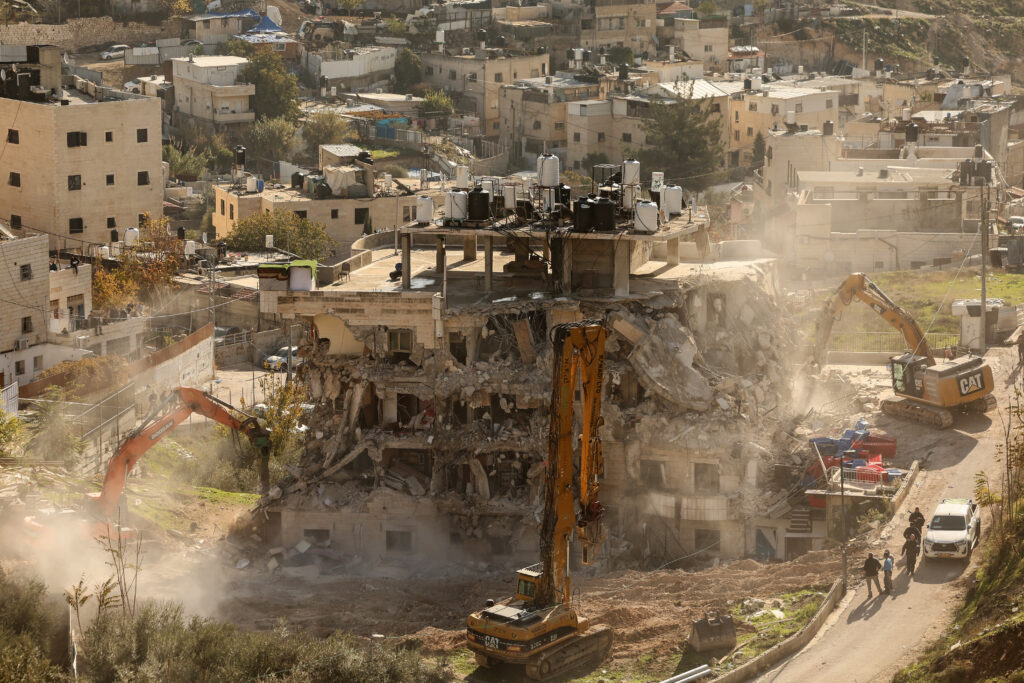Israel demolishes east Jerusalem building, evicting Palestinians
Israeli bulldozers tore through a four-storey building in east Jerusalem on Monday, leaving scores of Palestinian residents unsure where to go after their doors were broken down in the middle of the night by authorities enforcing hasty evictions.The building was the latest in a series of residential structures to be razed as Israeli officials target what they describe as unauthorised construction in the city’s annexed east — a campaign that local Palestinian officials characterised as a “systematic policy” to displace residents.”The demolition is a tragedy for all residents,” Eid Shawar, who lives in the building, told AFP.Located in the Silwan neighbourhood near the Old City, the building comprised a dozen apartments housing approximately 100 people, many of them women, children and elderly residents.”They broke down the door while we were asleep and told us we could only change our clothes and take essential papers and documents,” said Shawar, a father of five.With nowhere else to go, Shawar, 38, said his seven-member family would have to sleep in his car.”They are destroying my bedroom,” lamented one woman, as she watched the heavy machines rip through the building.Three bulldozers began tearing down the structure early on Monday as residents looked on, their clothes and belongings scattered across nearby streets, an AFP journalist saw.Israeli police cordoned off surrounding roads, with security forces deployed across the area and positioned on rooftops of neighbouring houses.By midday, a large part of the building had already been razed to the ground.Built on privately owned Palestinian land, the structure had been slated for demolition for lacking a permit, activists said.- ‘Systematic policy’ -Two Israeli NGOs, Ir Amin and Bimkon, said the demolition was the largest carried out in 2025, adding in a statement that “around 100 east Jerusalem families have lost their homes”.Palestinians face severe obstacles in obtaining building permits due to Israel’s restrictive planning policies, according to activists, an issue that has fuelled tensions in east Jerusalem and across the occupied West Bank for years.The building’s destruction “is part of a systematic policy aimed at forcibly displacing Palestinian residents and emptying the city of its original inhabitants”, the Jerusalem governorate, affiliated with the Ramallah-based Palestinian Authority, said in a statement.”Any demolition that expels residents from their homes constitutes a clear occupation plan to replace the land’s owners with settlers.”On Sunday, Israel approved the establishment of 19 new settlements in the occupied West Bank, part of a rapid expansion, but considered illegal under international law.The Jerusalem municipality, which administers both west and east Jerusalem, has previously said demolitions are carried out to address illegal construction and to enable the development of infrastructure or green spaces in the area.In a statement on Monday to AFP, the municipality said the demolition of the building in Silwan was based on a 2014 court order, and “the land on which the structure stood is zoned for leisure and sports uses and construction, and not for residential purposes”.”For a long period, the residents were granted extensions for the execution of the order and were offered various options in order to find a solution, but they declined to do so.”- Constant tensions -Activists, however, accuse Israeli authorities of frequently designating areas in east Jerusalem as national parks or open spaces to advance Israeli settlement interests.Silwan begins at the foot of the Old City, where hundreds of Israeli settlers live among nearly 50,000 Palestinians.The demolition there was “carried out without prior notice, despite the fact that a meeting was scheduled” on Monday to discuss steps to legalise the structure, Ir Amin and Bimkom said in their statement.”This is part of an ongoing policy,” they said.Meanwhile, residents and their relatives are worried.”You had children and even sick people like my brother, who is a cancer patient, living in the building,” Ashraf Sqafi told AFP as he watched the demolition.”All this is very painful.”The status of Jerusalem remains one of the most contentious issues in the Israeli-Palestinian conflict.Tensions are constant in east Jerusalem and its Old City, which Israel has occupied since the 1967 Arab-Israeli war. It swiftly annexed the area following the conflict.Those tensions have only intensified since the October 7, 2023 attack by Hamas that triggered the devastating war in Gaza.Israel regards east Jerusalem as an integral part of its capital, while the Palestinians want to make the city the capital of their future state.The UN deems Israel’s annexation of east Jerusalem illegal, and does not recognise Jerusalem as Israel’s capital.

